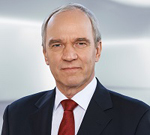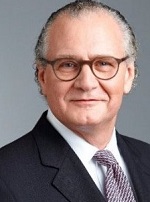 |
| Merck KGaA CEO Karl-Ludwig Kley |
Merck KGaA has been working on boosting business for a while now, striking deals and implementing a series of job cuts and reorgs to turn things around. Some of that work paid off in Q3, with earnings that beat the Street's predictions and better-than-expected sales for its top seller Rebif, even as the injectable MS med faces competition from newer oral rivals.
The Darmstadt, Germany-based company's earnings excluding some costs and one-time items jumped 10% during Q3 to €944 million ($1.02 billion), topping estimates of €919 million, Bloomberg reports. Sales grew 6.8% to €3.12 billion, falling a bit short of the Street's prediction of €3.17 billion.
Merck's Rebif contributed to that haul, bringing in €468 million and beating analysts' estimates of €453.8 million. This comes even as the bestseller faces increased rivalry from meds including Biogen's ($BIIB) Tecfidera, Novartis' ($NVS) Gilenya and Sanofi's ($SNY) Aubagio, as patients choose pills over injections. The company's fertility drug Gonal-f also chipped in some positive numbers with €167 million in sales during Q3.
But other drugs did not fare as well. Merck's cancer drug Erbitux missed the mark in the third quarter with €223 million in sales, falling short of analysts' expectations of €241 million. The company's heart med Concor also stumbled with €106 million in sales, an almost 10% drop.
Merck expects to kick things into a higher gear for the rest of the year. The company expects full-year sales, including those from its buyout of St. Louis, MO-based life sciences firm Sigma-Aldrich ($SIAL), to ring in at €12.6 billion to €12.8 billion, up from its previous forecast of €12.5 billion. Merck is also projecting EBITDA excluding one-time items of between €3.58 billion to €3.65 billion, a jump from its earlier prediction of €3.55 billion.
"Our organic growth in all three business sectors and all regions show that our strategy is bearing fruit," CEO Karl-Ludwig Kley said in a statement, adding that the company is "well-positioned for future growth."
 |
| Stefan Oschmann |
To achieve its goals, Merck will need to focus on consumer health and expanding in emerging markets. Uta Kemmerich-Keil, CEO of the company's consumer health unit, said in September that Merck would continue to grow in Latin America to boost its OTC business. And China "is growing strongly and is delivering a substantial contribution to growth," Kley said at the time, as quoted by Bloomberg.
But the company could face a tough road ahead under its newly appointed CEO Stefan Oschmann, who will take over for Kley in April 2016. Merck is reviving R&D in an effort to fight back against MS rivals, with Kley saying earlier this year that the company would invest in immuno-oncology. And in September, the company said it would give it another go with experimental MS drug, cladribine, despite a history of regulatory and clinical setbacks.
Still, the company's R&D gamble could come at a price, Primavenue analyst Marietta Miemietz said earlier this year. "If they fail in oncology and in MS, and they don't find anything transformational, then it's one big tail without anything new coming through," Miemietz said. "The biggest risk is that they get left behind in the innovation race."
- read the earnings statement (PDF)
- get the Bloomberg story
Special Reports: The top 10 best-selling multiple sclerosis drugs of 2013 - Rebif | Top 10 Drugmakers in Emerging Markets - Merck KGaA